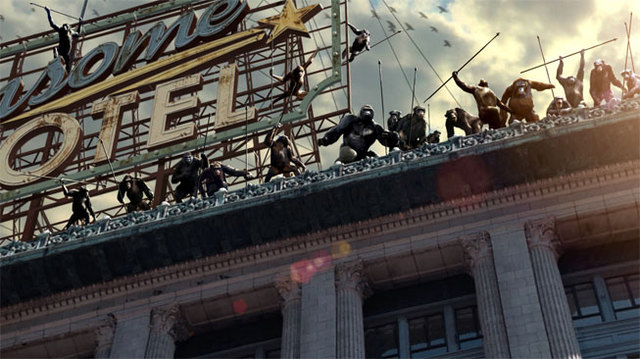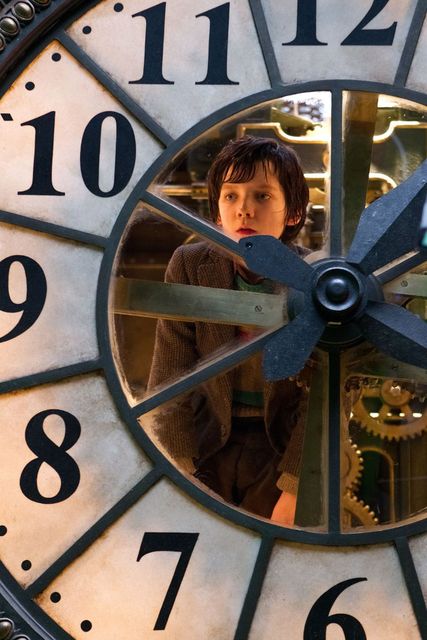The Artist Shooting a silent, black-and-white film in 2011 sounded like quite the attention-grabbing gimmick. The Artist is anything but a gimmick, however. It is one of two films this year (alongside Martin Scorsese’s Hugo ) to truly understand the magical, elusive alchemy of film. By stripping the medium back to its basics, The Artist shows just how powerful motion pictures can be. Silence, sound, word and image combine and contrast to paint an alternately heartbreaking and heartwarming portrait of a fading movie star (the charming Jean Dujardin) whose pride won’t allow him to fall in love with a rising starlet (the magnetic Bérénice Bejo). Writer-director Michel Hazanavicius employs the manipulative skills of a master magician to keep our attentions focused on one spot, while he works his magic in another. Could this be the first silent film to win the Best Picture Oscar since 1927’s Wings ? Mum’s the word. Beginners There’s a disarming lightness to this dramedy about love, life, death, cancer, marriage and Big Life Decisions. Ewan McGregor does subtle, intricate work as Oliver, a middle-aged guy whose life is rocked by the announcement that his widowed, 75-year-old father (the peerless Christopher Plummer) is gay. Our protagonist is about 90 percent OK with that. Unfortunately, it’s followed by the announcement that Dad’s also dying of cancer. Unsure of anything now, Oliver tries—perhaps unwisely—to start up a relationship with a groundless French actress (lovely Mélanie Laurent). The playfully disjointed narrative (which also throws in some sketchy illustrations and a dog that talks in subtitles) keeps viewers on their toes, skating back and forth through time and memory. What could have been navel-gazing introspection is instead warm, romantic and genuinely revealing. The Descendants Writer-director Alexander Payne has an unblemished record on film. ( Citizen Ruth, Election, About Schmidt, Sideways : every one near perfect.) The Descendants could be his best yet. Rarely have films used Hawaii as anything more than a background for bikinis and surfboards. This story, based on Kaui Hart Hemmings’ novel, digs deep into the heart and soul of the islands, introducing us to a humble, half-native land baron (the magnificently understated George Clooney) sitting on top of a nine-figure real estate deal. This difficult conundrum (sell to developers or keep it wild) is only compounded when our main man’s wife ends up in a coma and he’s forced to deal with a pair of troubled young daughters. The film gives everyone on screen the opportunity to be a real person. Great as Clooney’s paterfamilias may be, he’s easily matched by Shailene Woodley’s rebellious teen and Judy Greer’s oblivious wife. Hell, even Matthew Lillard is fantastic here! Drive This film is both a love letter to the seedy, unsentimental action flicks of the ’70s and a thorough autopsy of their corpses. (Watch it on a double bill with Walter Hill’s 1978 film The Driver to see where it’s coming from.) Cool-as-fuck star Ryan Gosling ( Crazy, Stupid, Love.; The Ides of March ) was another MVP this year (alongside Jessica Chastain and Emma Stone), taking on the unnamed antihero of this existential crime flick from Danish-American director Nicolas Winding Refn ( Bronson , the Pusher trilogy). Refn knows how to lens a mesmerizing movie—I can’t look away from his stuff even when he’s doing his damnedest to frustrate me ( Valhalla Rising ). But Drive is pure, blood-pumping, clutch-popping neo-noir pulp wrapped in an icy steel shell. The Help If this resonant historical drama gets Oscar attention, it will be because it contains so many great female roles. In a way, that’s kind of a bummer. Firstly, because Hollywood should have more than a couple of strong female casts every year. (This and Bridesmaids are 2011’s offerings.) And secondly, because The Help has more to offer than just an abundance of estrogen. The remarkably well-balanced script isn’t simply a tale of civil rights as viewed through the enlightened eyes of select white folks. (As a few naysayers unfairly branded it.) Instead, it’s the emotional story of a whole generation (several, actually) of black women entrusted to care for the most sacred possessions (children) of their employers yet who are somehow not allowed to use the same bathroom. It is this unbalanced but interconnected relationship that provides our diverse ensemble—openhearted Emma Stone, stoic Viola Davis, nasty Bryce Dallas Howard, outspoken Octavia Spencer and entirely wonderful Jessica Chastain—with such vivid characters to inhabit. Hugo At first, it was difficult to understand why Martin Scorsese would be so interested in directing a film based on a sci-fi-tinged kids’ novel. Then, in watching this glorious, whirling gewgaw of a film, it hit us. Hugo is nothing less than a parable about film preservation, an appeal to the wide-eyed kid in all of us awestruck at the imagination of the movie industry. Sprinkling this lesson on early film history with mystery, adventure, a hint of steampunk sensibilities and some of the most gorgeous 3D ever committed to camera only further cemented Scorsese’s rep as one of our most talented filmmakers. Sure, it probably plucks more at the heartstrings of rabid film fans (like me), but in using Brian Selznick’s heavily chiaroscuro-illustrated novel as a storyboard, Scorsese brings a genuine sense of magic and wonder back to the cinema. Midnight in Paris Woody Allen has always been a filmmaker to wear his muses on his sleeve—be they women (Diane Keaton, Mia Farrow, Scarlett Johanssen), cities (New York, London, Paris) or music (jazz and … more jazz). In that respect, Midnight in Paris is pure Allen. It’s also his best film since he tricked us into thinking he was having a major creative revival with 2005’s meticulous Match Point . Allen’s “European period” has yet to live up to that high-water mark. But this seductive little comedy about an unhappy writer (Owen Wilson, playing Woody Allen without playing Woody Allen) who finds himself transported back to Paris’ Golden Era every night after midnight is vintage Allen. Who wouldn’t want to spend their nights chatting it up with F. Scott Fitzgerald, listening to Cole Porter, watching Josephine Baker shake a leg, getting romantic advice from Salvador Dalí and being challenged to boxing matches by Ernest Hemingway? Inviting as this fantastical premise might be, Midnight in Paris wisely understands that nostalgia is a trap that keeps us from moving on with our lives. Sure, it’s a trifle of a film—but it’s Allen’s tastiest trifle since The Purple Rose of Cairo . Rise of the Planet of the Apes A prequel to a semi-forgotten, badly rebooted sci-fi series about a simian apocalypse? Who among us expected this to be anything other than monumentally silly late-summer entertainment? I’m still not sure how this turned out to be such a well-thought-out, well-made feature. It dovetails beautifully with the original film (check out the background details for copious plot points). It’s perfectly acted (Andy Serkis deserves some sort of special Oscar for making Caesar such a complicated hero/villain with nary a line of dialogue). And, for all its ape action, it’s a hell of a think piece on medical ethics, animal testing and scientific progress. Heck, this almost makes up for The Thing . The Skin I Live In Pedro Almodóvar took an unexpected turn into David Cronenberg territory with this shocking “body horror” thriller. Like Requiem For a Dream and The Wrestler , I’m not entirely sure I ever need to see it again. But there’s just no shaking it. As seductive as it is repellent, The Skin I Live In is art-house horror wrapped in a layer of melodrama, voyeurism and giddy polymorphous perversity. Take Shelter 2011 was, honestly, not the finest for art-house and foreign films. Standouts were few and far between. (Sorry, The Tree of Life and Melancholia just didn’t cut it.) But this low-budget, apocalyptic drama is a tornado blast of fresh (if not exactly comforting) air. Michael Shannon ( Revolutionary Road , “Boardwalk Empire”) is gripping as a small-town Midwestern father and husband plagued by storm-tossed visions of the end of the world. What works so well is that the film treats him as neither clearly crazy nor patently prophetic. Our poor, confused hero proceeds as if both possibilities are true—seeking help from a discount psychologist and building a doomsday shelter in his backyard. Damned if Jessica Chastain ( The Help, The Tree of Life ) isn’t here, too, providing significant support as our rain-fearing family man’s long-suffering wife. By turns ominous and illuminating, Take Shelter is a Stephen King novel turned upside down—the story of a man trying his level best to not find himself in the middle of a zombie-filled horror story.
Also worthy of attention in 2011: Bridesmaids; Cave of Forgotten Dreams; Harry Potter and the Deathly Hallows—Part 2; Moneyball; Incendies; Young Adult; Win Win; Crazy, Stupid, Love.







